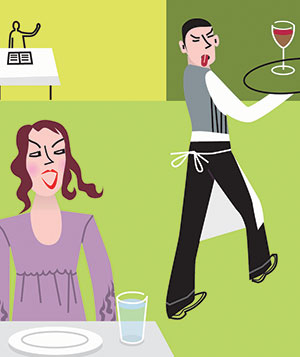When ordering food from a two-course menu it’s perfectly acceptable to skip the appetizer. But don’t expect your food to magically appear when it’s ready. Restaurant kitchens don’t work like that. Placing an order with only one course is what chefs call an “Order Fire”. This means that when the order comes into the kitchen, it is ready to be fired. Order Fire tickets drive chefs crazy because they disrupt the kitchen’s natural rhythm.
Here’s a simple primer on how food is expedited in most restaurants: All of the current orders are arranged chronologically according to when they are placed. As soon as each order comes into the kitchen, appetizers for each table are fired in succession. After the appetizers have been delivered, the corresponding ticket moves down the line and their main courses will be fired as soon as they are ready. If a ticket comes in “Order Fire” that order cannot cut in front of the entree line without slowing the main courses for those tables that have already had appetizers. A restaurant kitchen has a finite number of cooks that are equipped to produce only a specific amount of composed dishes at a time. Certain dishes like steaks and chops need time to rest off the grill and cannot be rushed. Usually the chef will try to sneak the Order Fire toward the beginning of the line but it will still usually result in a longer delay than expected. The idea that ordering less food will speed the arrival of your meal is a fallacy. So do yourself a favor–order something small to snack on before your mains. It will give the kitchen more time to carefully prepare your main courses–which tend to be more labor intensive–but also respects others dining around you making sure that their meals will not lag at your expense.


